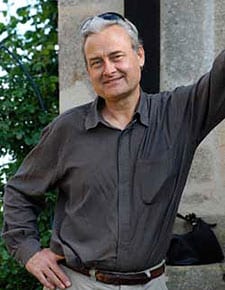Abstract:
After destroying multiple political rivals from neighboring kingdoms in Thailand and Vietnam, the Southeast Asian monarch known as Jayavarman VII (c.1125 to 1218 CE) reigned over the largest geographical expanse ever attained by the Angkorean Empire. Jayavarman VII’s instruments of rule simultaneously deployed extreme violence and profound compassion, brutal warfare and vigorous economic development. This talk will explore the contradictions and paradoxes of Jayavarman VII’s religious “infrastructure of compassion” that, for a time, held the empire of Angkor together, but ultimately fell into desuetude under the burden of its own ideology and the extreme “piety” of its patron. The life history of Jayavarman VII offers insight into the nature of rule and the role of religion in the construction and eventual disintegration of empire.
 Alan L. Kolata, the Bernard E. and Ellen C. Sunny Distinguished Service Professor at the University of Chicago, holds his Ph.D. in Anthropology from Harvard University. He specializes in organizing interdisciplinary research projects studying agroecology and the long-term interactions of humans with their physical environment, including the effects of climate change on human communities. He has conducted archaeological research in complex urban societies of the Andes including Tiwanaku in Bolivia and Moche and Chimú in Perú and recently wrote a synthetic book on the Inca. He has also conducted research in Thailand and, over the past 15 years, in Cambodia where he and his collaborators currently focus on the physical, biological, and social impacts of large-scale hydroelectric development of the Mekong River Basin.
Alan L. Kolata, the Bernard E. and Ellen C. Sunny Distinguished Service Professor at the University of Chicago, holds his Ph.D. in Anthropology from Harvard University. He specializes in organizing interdisciplinary research projects studying agroecology and the long-term interactions of humans with their physical environment, including the effects of climate change on human communities. He has conducted archaeological research in complex urban societies of the Andes including Tiwanaku in Bolivia and Moche and Chimú in Perú and recently wrote a synthetic book on the Inca. He has also conducted research in Thailand and, over the past 15 years, in Cambodia where he and his collaborators currently focus on the physical, biological, and social impacts of large-scale hydroelectric development of the Mekong River Basin.
For an update on the research in Cambodia see a shot article on their project Human Response to Environmental Change in the Lower Mekong River Basin.
 Alan L. Kolata, the Bernard E. and Ellen C. Sunny Distinguished Service Professor at the University of Chicago, holds his Ph.D. in Anthropology from Harvard University. He specializes in organizing interdisciplinary research projects studying agroecology and the long-term interactions of humans with their physical environment, including the effects of climate change on human communities. He has conducted archaeological research in complex urban societies of the Andes including Tiwanaku in Bolivia and Moche and Chimú in Perú and recently wrote a synthetic book on the Inca. He has also conducted research in Thailand and, over the past 15 years, in Cambodia where he and his collaborators currently focus on the physical, biological, and social impacts of large-scale hydroelectric development of the Mekong River Basin.
Alan L. Kolata, the Bernard E. and Ellen C. Sunny Distinguished Service Professor at the University of Chicago, holds his Ph.D. in Anthropology from Harvard University. He specializes in organizing interdisciplinary research projects studying agroecology and the long-term interactions of humans with their physical environment, including the effects of climate change on human communities. He has conducted archaeological research in complex urban societies of the Andes including Tiwanaku in Bolivia and Moche and Chimú in Perú and recently wrote a synthetic book on the Inca. He has also conducted research in Thailand and, over the past 15 years, in Cambodia where he and his collaborators currently focus on the physical, biological, and social impacts of large-scale hydroelectric development of the Mekong River Basin.